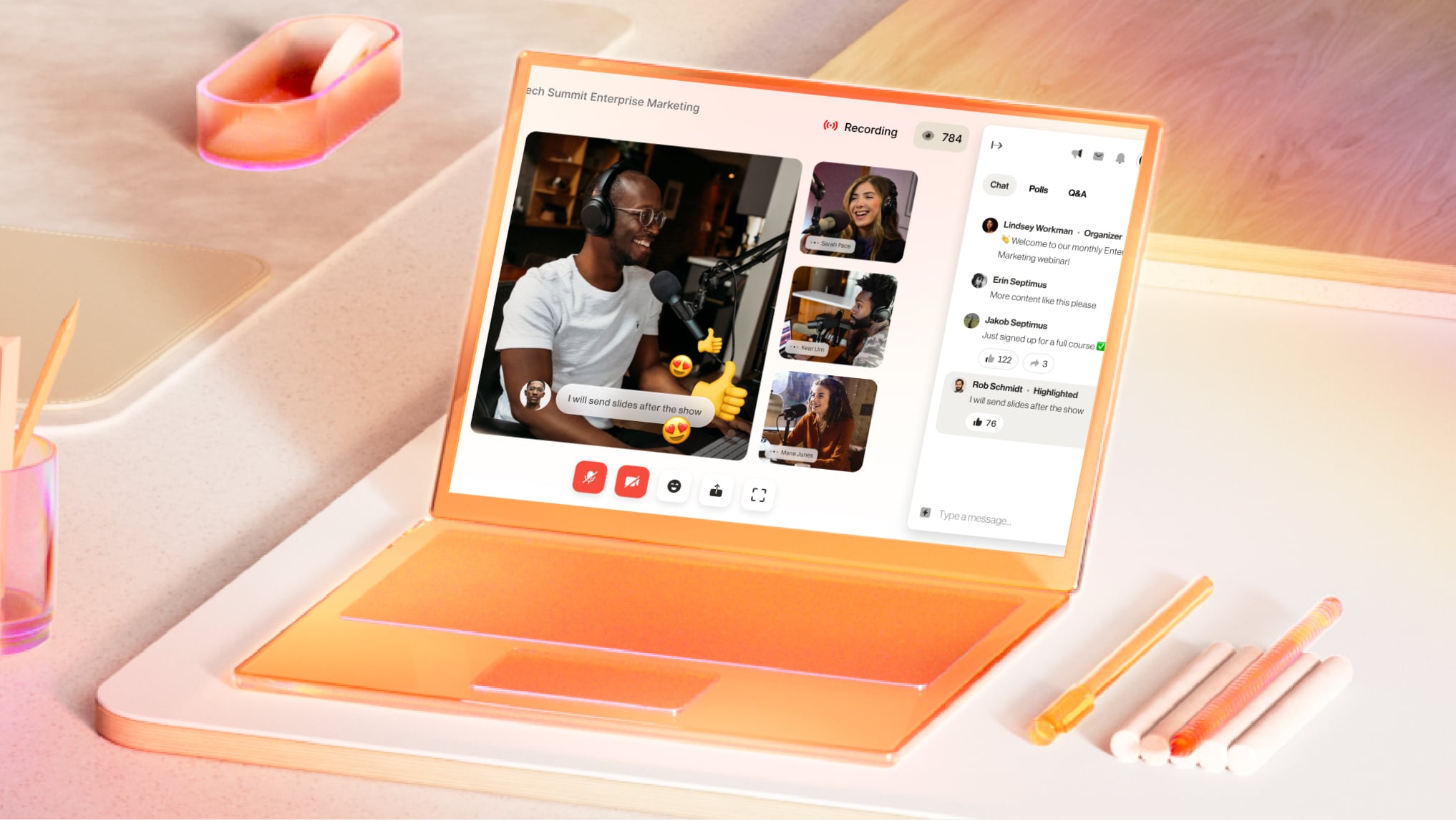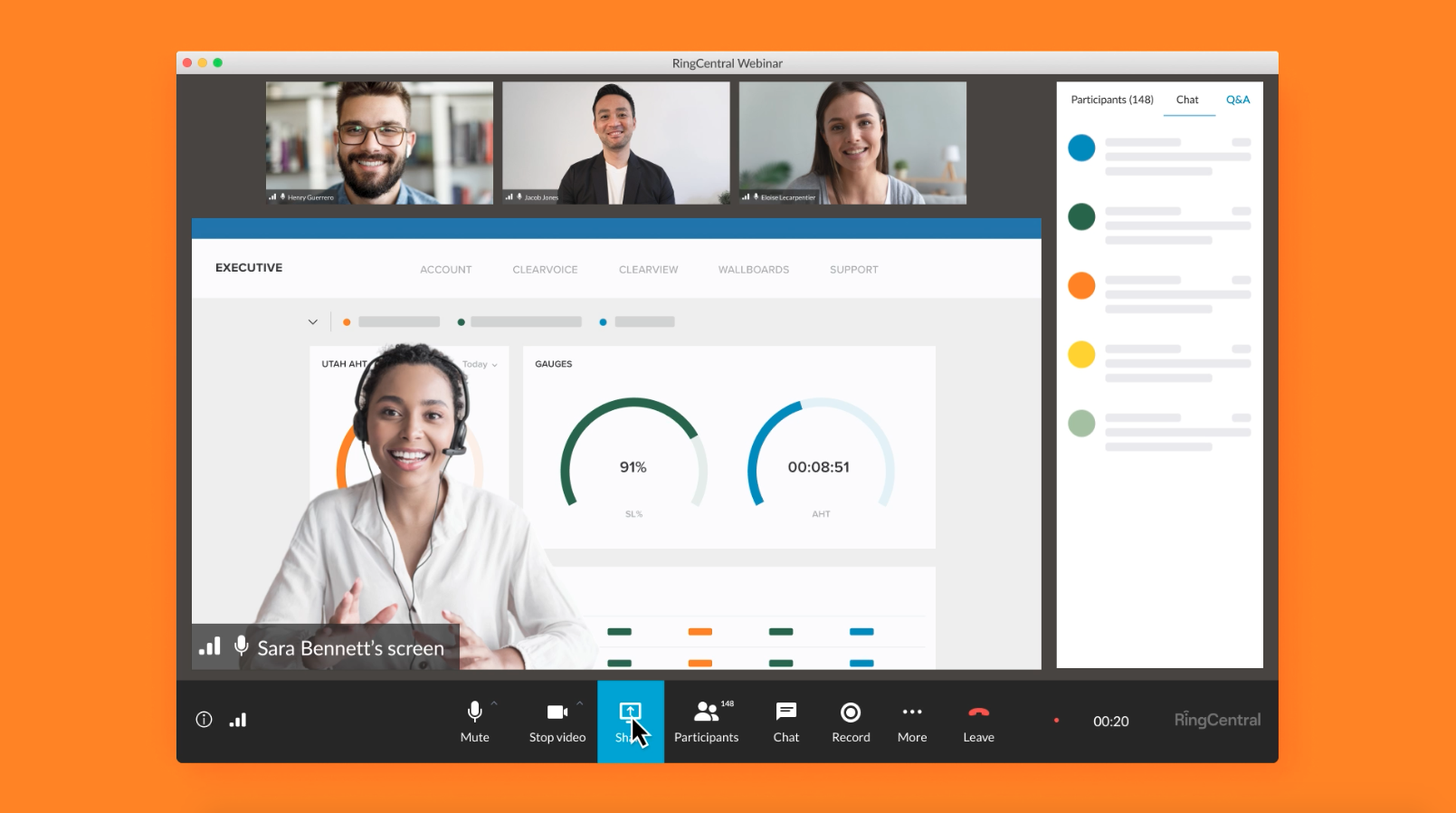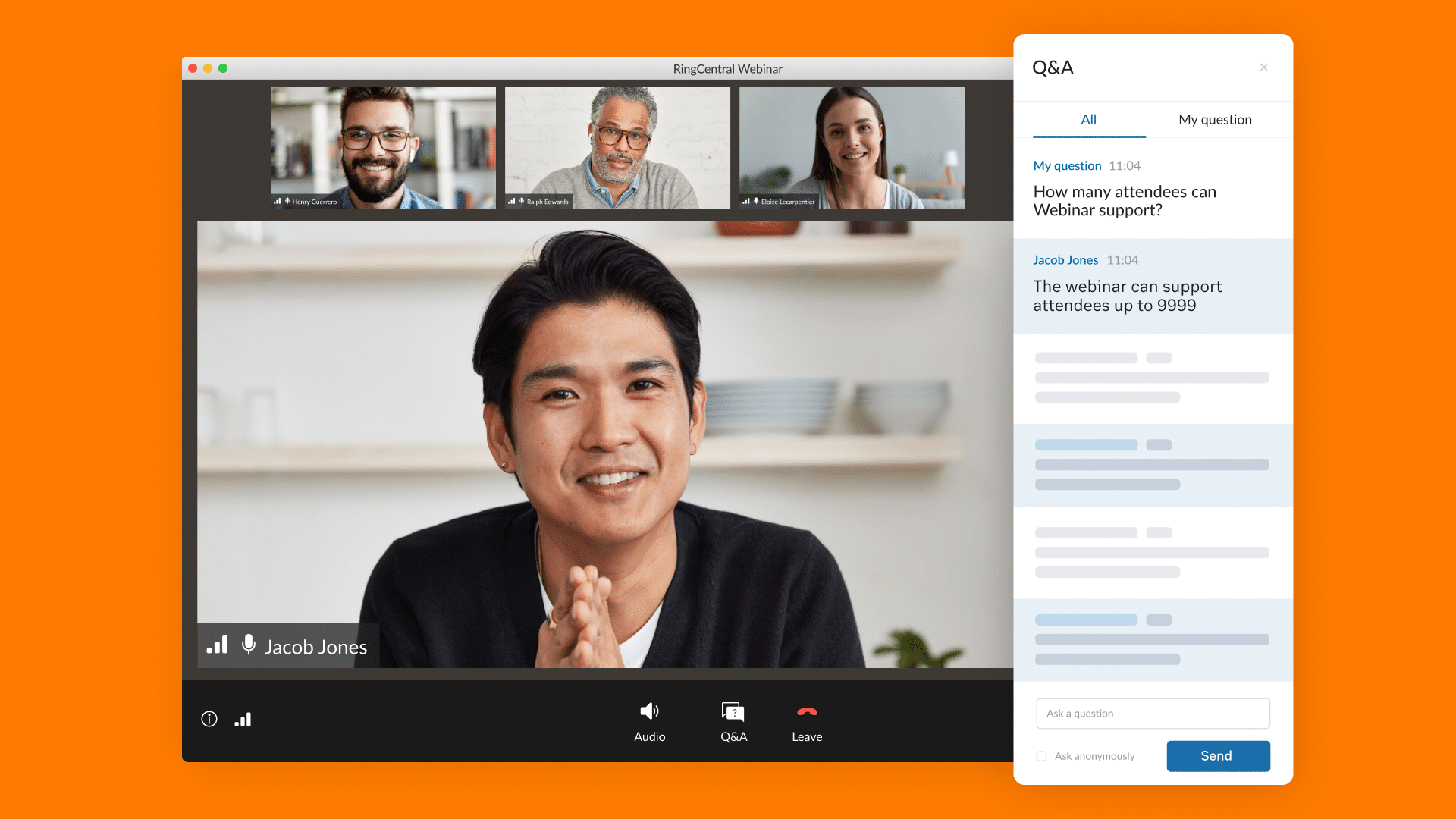Hopin is now RingCentral Events
I am a 15-year veteran of B2B corporate event management. I have organized hundreds of events for five brands, which have drawn hundreds of thousands of participants.
So, naturally, last year was like an earthquake for me and my peers in event marketing. In a socially distanced world, we were no longer able to do the thing we love: bring people together around in-person experiences.
Yet, in spite of all the adversity, I saw my tribe respond with ingenuity. Like so many, my team pivoted to a new way to bring people together: virtual events.
Very quickly, we realized that virtual events had a lot to offer. While they couldn’t reproduce the feeling of sharing physical space with kindred spirits, they did allow us to reach more people across geographic barriers and create new kinds of connection.
Now, as a post-pandemic future comes into focus—fingers tightly crossed—my peers and I are eager to bring back in-person events. But I’m not as eager to let go of the lessons I’ve learned from hosting online events.
That’s where hybrid events come in.
Hybrid events bring together the best parts of in-person and virtual events—the human connection of IRL and the reach and inclusiveness of online. Indeed, for my team, hybrid is the new model for all of our events.
Here are eight reasons why I believe the future of events will be hybrid.
1. Hybrid gives you greater reach.
One of the main advantages of taking a hybrid approach—of adding an online layer to an in-person event—is scale.
When event managers organize an event, we work really hard to attract as many attendees as possible.
For in-person events, however, attendance is often limited by the ability of participants to get approvals for travel, time away, and reimbursement for ticket costs. In fact, planners often have to help write ROI justification letters.
Imagine what attendance could look like when we don’t have to factor in travel or, say, a $1,695 ticket cost (the kind of sticker price that helps cover the cost of physical resources like venue rental).
That’s what hybrid unlocks.
Over the last year, our experience with virtual gatherings has shown us that physical barriers need not stand in the way of reaching a large, distributed audience.
By adding an online layer to a physical event, it becomes possible to both accommodate more of our potential audience and enable more of that audience to join—so we can achieve higher levels of attendance, from the hundreds to the hundreds of thousands of people.
As an example, when The Atlantic hosted an online version of its flagship conference on Hopin, its attendance grew 13x, compared to its prior in-person events.
After the festival, Chief Operating Officer Aretae Wyler noted: “Even after we go back to doing things in person … this is going to continue to be a way we want to connect with our audience.”
For brands, that kind of global reach can translate to:
- Greater brand awareness and affinity
- Increased audience engagement
- Expanded website traffic and form-fills
- Even more revenue
Specifically, shifting to a hybrid event creates new opportunities for monetization, via online ticket sales and sponsorships, as well as lead generation.
2. Hybrid increases your event ROI.
The expanded reach of hybrid events also comes at a significantly lower cost than if we were to increase the size of a 100% physical event.
As we have learned over the last year, virtual events generally cost less to plan and host (in terms of time, money, and effort) than in-person events. That cost-efficiency has created more opportunities to host events, too.
Adding an online layer to our in-person events lets us grow attendance dramatically—and at a dramatically lower marginal cost. Meaning, we don’t need to rent a larger or additional event space, etc.
When we are able to increase the payout of an event (by attracting a huge new audience, which we may even monetize) without a proportional increase in cost, we are able to generate a greater ROI on an event.
In other words, the value we get out of hybridizing our event exceeds the extra investment we might have to make to add a virtual layer to our in-person event.
Growing event ROI is among the biggest benefits of hybrid events.
3. Hybrid expands participation and accessibility.
Hybrid allows for more inclusive events.
Fully physical events are location-bound. The only people who can attend are those who are already in that location or those who have the ability—the resources, availability, health—to travel there.
Not only does this exclusivity shortchange our brand by limiting reach arbitrarily to those nearest our event venue—it also hurts content quality. For example, top-shelf speakers or presenters may not be able to commit a full day or two to participate in-person at our event.
In contrast, a hybrid event opens an online channel for participation. Presenters and attendees can join from anywhere in the world, helping to enrich event content with a diversity of perspectives.
For presenters and speakers, this means a commitment of a few hours rather than a few days, so they can book more engagements and grow their brand.
For attendees, this means higher-quality programming and the ability to engage with brands, content, and attendees, even if an event is taking place in a different city or country. (That includes avoiding the need for approvals for cost of travel.)
And for event managers like me, this means:
- Greater ability to attract in-demand speakers and panelists because the friction of travel and scheduling is reduced.For instance, when The Information planned an online version of its WTF Summit (Women in Tech, Media and Finance), they were able to snag acclaimed speakers like Laurene Powell Jobs (Emerson Collective) and Emily Weiss (Glossier), who would not have been able to participate in a physical event.
- Saving budget that would otherwise be expended on line-items like T&E (travel and expenses)—so that I have the capacity to expand my program, book more expensive talent, and/or further enhance the production value of my content.
- Unlocking a broader conversation that is informed by the interplay of a variety of geographic perspectives.
Crucially, hybrid also helps make events more accessible for those who may not be able to join in person for reasons of health or physical ability.
4. Hybrid unlocks deeper audience engagement.
In addition to expanding access, hybrid transforms the nature of audience participation.
Audience engagement is one of the most important elements of an event. We don’t want our attendees to be spectators. Instead, we want them to be active participants, to help shape the conversation in real time.
That means sharing ideas, questions, and feedback; engaging with speakers and sponsors; and promoting the brand, event, and content to their own networks.
Events are successful insofar as they create opportunities for audience involvement.
By that criterion, hybrid events offer a significant advantage because they allow all participants to communicate with each other, opening up a multi-directional flow of ideas and information:
- Online participants (meaning, both presenters and attendees) can engage with other online participants
- Online participants can reach out to and communicate with in-person participants—and vice versa
- In-person participants can find and connect with other in-person participants, via the online event platform
Note that last bullet. Not only do hybrid events make it possible for online and in-person audiences to interact—they also elevate the overall in-person experience, by making it easier for in-person attendees to find and network with each other.
What unlocks the engagement power of hybrid?
A virtual event platform—which acts as a bridge between the online and in-person experiences. An event platform is the online destination for our event, which not only hosts the content but also provides the channels by which all this interaction occurs.
5. Hybrid provides data-driven insights.
One of the most powerful aspects of online events is analytics.
Traditionally, my peers have relied on general KPIs (registrations, attendance, etc.) to determine the effectiveness of our in-person events.
In the last year, I have been blown away by the granular data and sophisticated insights I have been able to draw from virtual events—thanks to reporting available in some virtual event platforms.
Because virtual events are hosted online, we are able to get more specific about how our audience is engaging with our event content—including how long people are tuning in for, when they’re bouncing, the topics that drive the most questions and participation, and so on.
Hybrid events offer that same benefit. Adding an online component to an in-person event gives us a much better view into what is actually working and what isn’t.
Those insights have incredible value in helping us determine the true ROI on an event and optimizing future events based on audience behavior.
But they also have the ability to inform our content, marketing, and business strategies more broadly—by giving us a clearer picture of what value props are most persuasive, what pain points matter most to our audience, and what topics and ideas resonate with them.
Crucially, analytics is platform-dependent—which is why it’s important to select the right software or digital environment for our event if we want to take advantage of this opportunity. Most often, that means using an online event platform.
6. Hybrid can power community building.
As our CEO Johnny Boufarhat has said, if events are moments in time, communities are everything in between.
An event is a uniquely compelling way to bring people together and motivate engagement. But communities are how we can sustain brand-audience engagement, even after an event.
A hybrid event can easily transition into an online community—where a brand can nurture the same audience over time, where attendees can continue to interact with the brand and each other, and much more.
Lasting engagement like this can help generate business pipeline, but also serves as a way to build brand loyalty and affinity, source ideas from our audience, and inspire evangelism.
7. Hybrid fuels your content engine.
Another important benefit of hosting hybrid events is that the event program becomes a great source of content for future marketing efforts.
While hosting our event, we can record all of our presentations—keynotes, panels, Q&A, etc. Then we can repurpose full recordings, clips, and sizzle or highlight reels for fresh organic and paid content for weeks or months after the event:
- Replay the event for other time zones in order to broaden reach and impact
- Drive new leads by making sessions available on-demand behind an email gate
- Nurture our online community by circulating event content and continuing vital conversations
- Improve ad performance by using video clips on paid social channels
- Get SEO value from our event content by transcribing and posting as articles on our company blog
Where in-person events typically have limits, hybrid events can extend the impact we can have across time, channels, and old and new audiences.
8. Hybrid can be more environmentally friendly.
Going forward, sustainability will be an increasingly critical consideration for event managers.
Over the last year, we saw how virtual dramatically reduced the carbon footprint of events. Instead of large in-person venues, hundreds or thousands of people traveling by car or airplane, and a lot of waste generated, online events made it possible to bring together large groups of people at minimal cost to the environment.
Hybrid has similar advantages. For the same event size, hybrid can be much more environmentally friendly than an in-person event.
For instance, instead of having 25,000 people join in-person for a 100% physical conference, a hybrid conference might entail 5,000 people joining in-person with the remaining 20,000 (or 50,000 or 100,000 more) joining remotely.
Without sacrificing reach, we can encourage less travel, use a smaller physical space, generate less waste, and require fewer resources to host an event.
In other words, the great scale that hybrid allows doesn’t have to come at the cost of the environment.
Conclusion: Hybrid reimagines events for the better
No one is more excited for in-person events to return than event managers.
We know the power of events to bring people together, help them form meaningful connections, and inspire real action in the world.
But events in the future will not be the same as they were pre-Covid. Rather, they will incorporate the advantages of in-person (e.g., human connection) with those of online (e.g., scale, greater participation, ROI).
Hybrid events unlock the ability to do a lot more—to reach and engage a larger audience—with the same or fewer resources.
That’s why, as my team charts the future of our own corporate events, hybrid will be central to everything we do.
Originally published Sep 01, 2022, updated Oct 24, 2024





